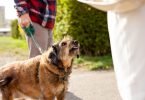Often, dogs suffer from deathly coughs like us, humans. When that happens, they can be found coughing away, making rough and loud noises, or continuously making choking sounds, known as kennel cough. It is also known as tracheobronchitis. It is an exceptionally infectious respiratory illness.
Kennel Cough: A summary
This infection also has many reasons for occurring, similar to the spreading and contracting of the common cough viruses in humans. The bacteria responsible for this is known as Bordetella bronchiseptica. Also, this condition is frequently called Bordetella.
Nearly all pups are tainted with an infection simultaneously when they become contaminated with Bordetella.
These infections involve canine adenovirus, canine herpes infection, parainfluenza infection, canine reovirus, and canine distemper infection. These make dogs increasingly defenseless to contracting Bordetella disease.
Pups contract kennel cough when the virus or bacteria make way to their trachea (windpipe) via breathing. A lining of mucus traps unwanted bacteria, but several environmental factors can make this shield fragile, and make dogs inclined to contract kennel cough, irritating the voice box (larynx) and trachea.
The reasons include
- Poorly ventilated areas in rescue shelters and kennels
- A cool environment
- Limitless exposure to pollution and burning nicotine.
How do dogs get kennel cough?
It usually spreads through public places like vet clinics, dog parks, daycares, grooming parlors, etc. Direct contact with the infected pup (like touching noses), airborne saliva particles from excessive cough, or sullied surfaces (including toys, food/drinking containers) can spread the disease to other dogs.
It’s exceptionally treatable in many pooches, however, can be more serious in dogs with age less than six months and ones with an impaired immune system.
Symptoms
The definitive symptoms include a repetitive, rough cough. It sounds like honks of a goose. Other persistent symptoms include:
- Low fever
- Loss of appetite
- Runny nose
- Sneezing
- Lethargy
- Eye discharge
How Is Kennel Cough Treated?
Kennel cough is contagious. It spreads from direct contact with the infected, bacteria-infested surfaces and public areas where many kinds of dogs gather, i.e., dog parks. Keep your dogs from infecting others if you think your dog has been infected. Contact your trusted vet as soon as possible.
Antibiotics
Although, in most cases, kennel cough resolves without treatment, proper medicines can accelerate recovery or lessen the symptoms during the entirety of the infection. Recommended medicines include antibiotics and regular cough medicines targeting Bordetella bacteria.
You can try Fur Goodness Sake Cough Medicine for Dogs. It contains organically sourced plant-based extracts, Mullein Leaf and Elderberry. Many others have used this medication on their dogs, and it has worked wonders.
Additionally, use harnesses instead of leashes, as the collar can aggravate the cough. Please keep them in an area with proper ventilation and humidity.
How long does Kennel Cough take to recover?
Three weeks can drag up to 6 weeks. Most of the affected pups show signs of recovery within three weeks. In senior dogs and those with other medical conditions, it can take up to 6 weeks for them to recover.
Keep up with your vet and let them know about any developments because prolonged kennel cough infection can develop into pneumonia if conditions worsen.
However, if your dog shows signs of rapid breathing, drowsiness, or has stopped eating, contact your vet at that moment. These could be symptoms of something very dangerous.
Vaccines
Three forms of vaccines are available for kennel cough: one as an injection, another as a nasal mist, lastly, one administered by mouth. These are administered in two doses, in an interval of two to four weeks. Follow up with your vet every six months to a year later.
Even though they might help, these don’t guarantee any form of protection against this contagious infection or infectious tracheobronchitis as a variety of contagions, and bacteria and viruses around them can cause this. Furthermore, these vaccines will not treat any active infection present in your pup.
These oral and intranasal vaccines are usually administered once a year. These often are recommended every six months for dogs with high risks for kennel cough. These vaccines, rather than their injected counterparts, tend to protect the pups against kennel cough sooner.
5 Ways of Taking Good Care of Your Dog with Kennel Cough

Give Your Dog Honey
Honey contains enzymes, antioxidants, and flavonoids. This assists in soothing their throats.
Humidifiers
Humidifiers can moisten the irritation brought on by the kennel cough. Put it near their beds while they sleep.
Keep Them Away from Smoke and Pollutants
Smoke and pollution can worsen the present condition. Keep them indoors, and do not smoke any substances around them.
Encourage Adequate Rest
Similarly to humans, a good rest in dogs can speed up recovery signs. Get them enough rest in a well-ventilated and commotion-free space.
Cough Suppressants
Cough suppressants keep dogs comfortable and decrease frequent coughing. It also reduces the irritation caused by the cough.
Kennel Cough in older Dogs
Many factors make senior dogs cough. It could be Bordetella or something chronic. The condition can also lead to pneumonia for older dogs.
Besides, several other reasons can cause a cough in a senior dog, including:
- Heart diseases
- Cancerous tumors
- Laryngeal Paralysis
- Respiratory infection
- Distemper
- Asthma
- Unknown body stuck in the throat
- Valley Fever
The incubation period
The infected ones start coughing within two days after exposure. Therefore it’s hard to pinpoint the source. The cough usually lasts about five days and then gradually stops in the coming weeks. Immunocompromised senior dogs can take twice the time to recover.
Treatment
It’s always safer to take the older dogs to your trusted vet if they’re showing signs of kennel cough. They’re most likely to recommend cough suppressants and/or humidifiers to speed up the recovery process.
Now that you have gone through this article, you should know everything about kennel cough, including the causes, the symptoms, and the treatments.






